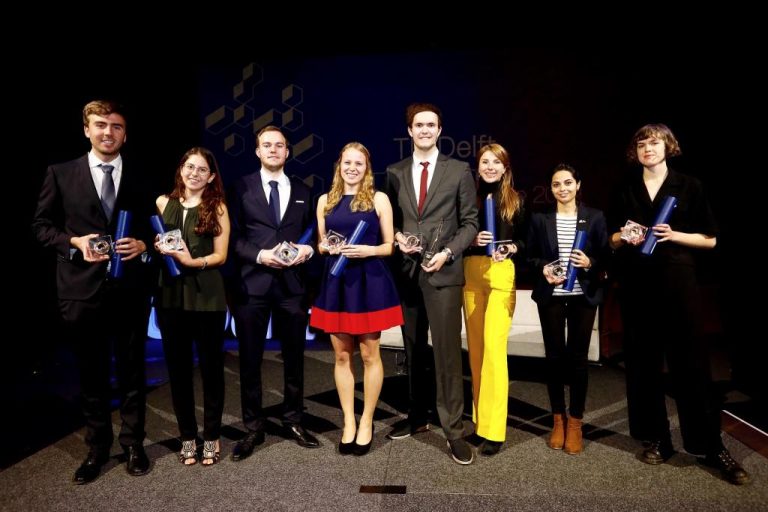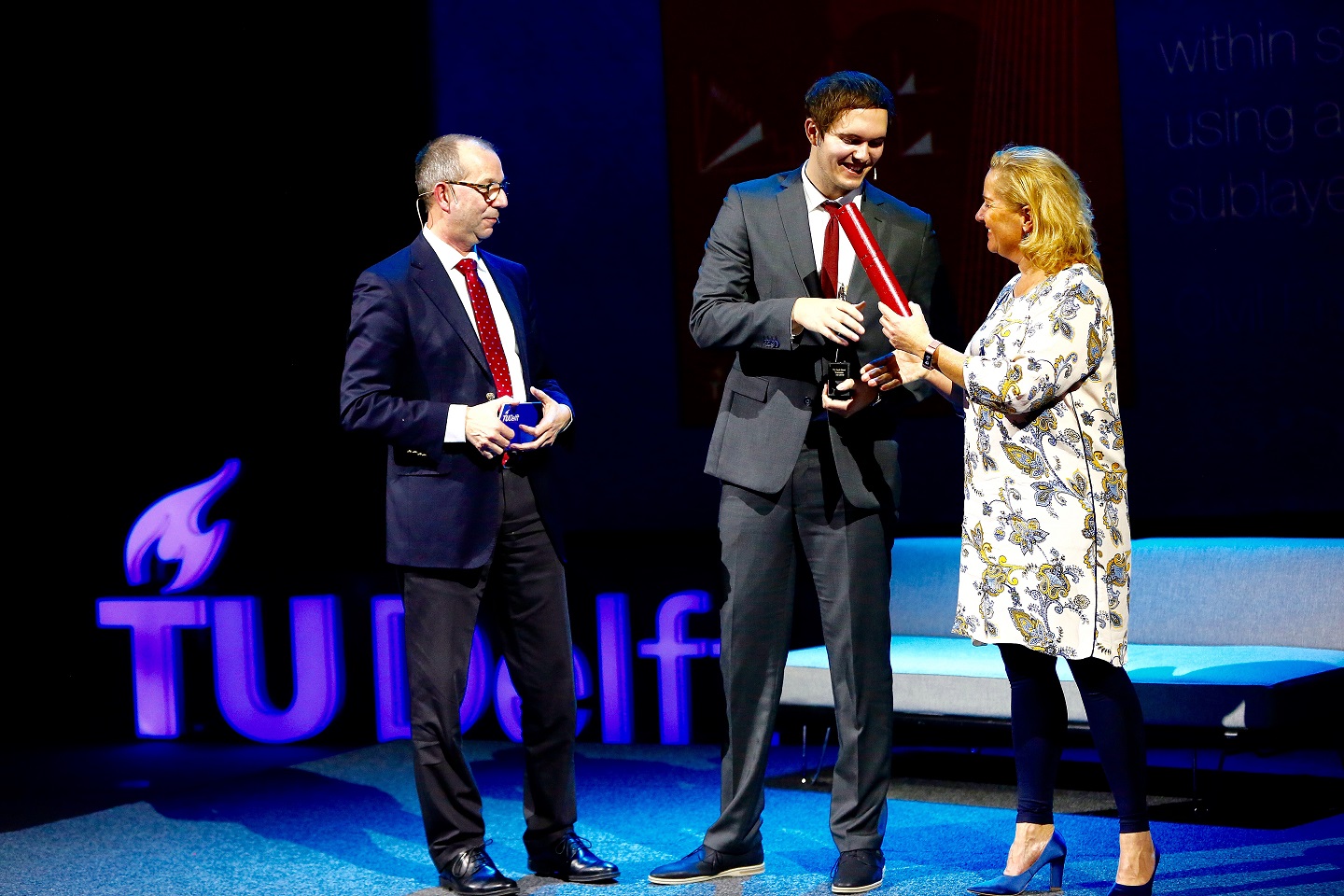Djonno Bresser was elected Best Graduate 2019. He graduated in Civil Engineering and Geosciences on modelling fractures in concrete structures.
Photo caption: Djonno Bresser receives the award from Evelyne Esveld, Director of the University Fund. (Photos: Roy Borghouts)
To resounding applause, 22 year old Djonno Bresser received the prestigious ‘Best Graduate 2019’ award last Tuesday 12 November. According to Rob Mudde, Vice Rector and Chair of the jury, Bresser had chosen a very challenging graduation subject: the modelling of fractures in concrete structures. He received a 9.5 for his thesis, graduated with distinction, earned 138 instead of 120 ECTS, and the model that he developed was included in the software programme Diana.
Congratulations, you are the Best Graduate 2019. Did you expect this?
“No, I really didn’t. My graduation research is quite sober material and not easily accessible to the general public. Some of my peers’ subjects were more appealing and I thought that one of them would win.”
This title, in your words, is ‘a gigantic crown’ on your work. Do you always strive for the best?
“Yes, if I start something, I give it my best shot. This isn’t always easy for those around me as I’m a perfectionist. But it’s just that trait that makes me do the best I can.”
That can’t be easy in the times we live in. Students are under more and more pressure and are stressed. Did you experience this?
“I think that most stress comes from the extra-curricular activities such as being on committees. I consciously chose to get the most out of my student time. I wanted to work on theoretical concepts that I could later apply in practice. You develop a certain way of thinking at TU Delft. You learn to analyse a problem and then simplify it. I used this approach in my graduation project. But I too took on too much at times.”
How did you deal with it?
“I let go. I did something different, like go to the zoo for the day. I learned that trying to continue when you’re stuck would only make it worse.”
But in the end you did more than was required. Without any delays in your studies you attained 138 ECTS instead of 120 ECTS. What was your motivation?
“I have strong self-motivation. I am very curious and have a sort of love affair with technology. If I come across a problem, I want to sort it out. I get restless if I can’t examine it further. But I do have to say that I usually pick things up more quickly than others. For the rest, it’s also a matter of good planning. I worked about 55 to 60 hours on my graduation project. From home then as that saved travel time.”
And you also had a part-time job I understand?
He laughs. “Yes, I worked at a supermarket for a long time. Apart from being relaxing, I also learned a lot. You deal with so many different types of people and develop soft skills that you don’t learn on your degree programme. I worked on my supervisory skills and these are qualities that I will benefit from for the rest of my life.”
How did you continue your career after you graduated?
“I now work as a structural designer at Van Rossum Raadgevende Ingenieurs, one of the larger companies in the sector. At the moment I am observing and am learning a lot. Ultimately I will start working myself.”
You thus did not opt for a scientific career. Was that a conscious decision?
“After only focusing on theory for a few years, I want to experience applying that knowledge. At the moment I feel very stimulated and challenged and I hope that I remain like this for a long time. I am learning something new every day.”
Your work has been included in a software programme for civil and geophysical applications and has a lot of potential to be put into practice. What is it like to have other people wanting to continue what you started?
“It is a wonderful token of appreciation for my graduation work. I have to say that I had underestimated the impact of my work and did not expect that it would lead to applications so quickly. It’s an honour that other people are continuing my work. I secretly hope that I will stay a tiny bit involved though.”
Would you ever return to TU Delft?
“I’m not thinking about it now, but I’m keeping all my options open. I can imagine that I will use my skills in the academic world again at some point. Who knows, maybe an opportunity will arise to combine two directions – theory and practice.”
What is the most important lesson that you learned while graduating?
“Try to unpack complicated material into simple concepts. I saw that I remembered things better if I understood them well. You retain knowledge the longest this way. I also advise everyone to look for a graduation project in their area of interest. This really helped me stay motivated.”
What are you going to do with the award money?
“I think I will go on holiday next summer and put the rest in my savings account. As a first time buyer on the housing market, I can use all the money I can get.”


The University Fund holds the Best Graduate award ceremony every year. Each faculty nominates one graduate. The nominees this year were (from left to right):
- Serban Leveratto (Aerospace Engineering)
- Marta Pita Vidal (Applied Sciences)
- Jonah Poort (Mechanical, Maritime and Materials Engineering)
- Christine van Bergen (Technology, Policy and Management)
- Djonno Bresser (Civil Engineering and Geosciences)
- Dasha Simons (Industrial Design Engineering)
- Azqa Nadeem (Electrical Engineering, Mathematics and Computer Sciences)
- Freya Spencer-Wood (Architecture and the Built Environment)
Do you have a question or comment about this article?
m.vanderveldt@tudelft.nl


Comments are closed.